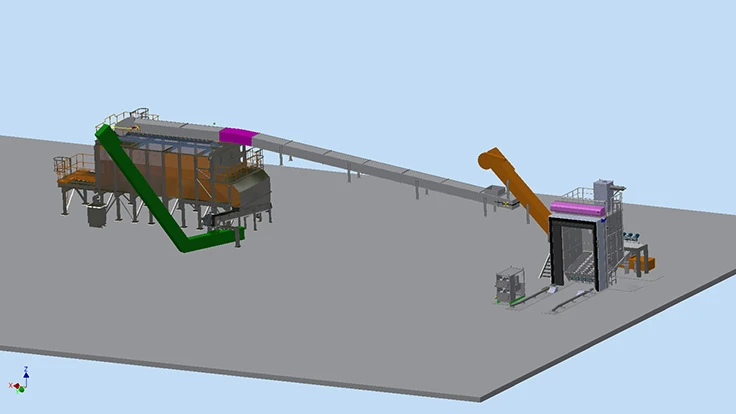
Southampton, United Kingdom-based Saxlund International says it is providing equipment and technology to a commercial bio-substitute natural gas plant that will convert up to 10,000 metric tons annually of municipal solid waste (MSW) into 22 gigawatt hours (GWh) of synthetic natural gas.
Saxlund says the “pioneering green gas generation plant” is under construction at Marston Gate in Swindon, U.K., by U.K.-based Advanced Plasma Power and U.K. utility Cadent. The plant is being designed to use an automated fuel reception and delivery system developed by Saxlund, which describes itself as a biomass and material handling specialist.
The £25 million ($32.3 million) facility, which is due to start operating in early 2018, will be the first commercial plant to convert MSW into bio-substitute natural gas (BioSNG), says Saxlund, and it has received £11m ($14.2 million) of funding from the U.K. Department for Transport’s Advanced Biofuels Demonstration Competition.
Once operational, the plant will convert the 10,000 metric tons of MSW each year into BioSNG, “enough to heat 1,500 homes or fuel 75 heavy goods vehicles each year,” according to Saxlund. Waste will be delivered once per day in a moving floor trailer and up to 150 cubic meters (196 cubic yards) will be stored to provide a buffer for weekend operations.
Saxlund was chosen to provide an automated system incorporating fuel reception, storage and discharge of refuse-derived fuel (RDF) to feed the downstream fluid bed gasifier, which in turn is closely coupled to a plasma converter.
The system incorporates Saxlund Truck Docking Stations (SAX-TDS) designed to allow walking floor trailers arriving at the plant to be quickly unloaded, together with a push floor storage bunker with 100 cubic meters (131 cubic yards) of capacity, and chain conveyors to next transport fuel to the gasifier.
The Saxlund Truck Docking Station is designed to allow spillage free delivery of RDF to the plant and incorporates screw conveyors to provide a metered flow of material as it is transferred from the trailer into the push floor storage bunker. A dust filtration system and inflating seals between the docking station and delivery trailers has been designed to minimize dust emissions.
“Producing 80 percent lower carbon emissions than fossil gas, BioSNG is recognized as being key to decarbonizing heat and transport in the U.K. and internationally,” says Matt Drew, managing director for Saxlund International. “We are delighted to be involved with this pioneering project at Marston Gate. Like all of the bioenergy and gasification plants we are currently involved with, fuel handling and storage are critical areas to get right to ensure plant efficiency and peak productivity.”
Saxlund International says it is playing a role in more than 14 RDF and biomass fuel handling and storage systems for bioenergy and gasification plants in Europe. The company has offices in the U.K., Sweden and Germany, with annual sales of €35 million ($41.6 million), 85 employees and a range of services that includes design, engineering, manufacturing and construction.
Latest from Recycling Today
- U.S. Aluminum Co. explores aluminum fabrication plant in Oklahoma
- Sonoco completes portfolio transformation
- Eriez Shred1 data demonstrates scalable copper control
- RCI selects CurbWaste as exclusive operational management platform
- Updated: Supreme Court strikes down IEEPA tariffs
- Recycling Today Media Group launches Scrap Expo Lunch & Learn Webinar Series
- LyondellBasell scales back recycling target
- Former Liberty UK mills eyed by 3 suitors





